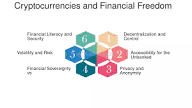THE FUTURE OF MONEY: SHOULD WE ABANDON TRADITIONAL CURRENCIES AND FULLY EMBRACE CRYPTOCURRENCY
INTRODUCTION
.jpg)
Imagine a world where all transactions, salaries, and savings are entirely based on cryptocurrency. No more banks, no more physical cash, no more government-backed currencies. It's a radical shift that some say is inevitable, while others fear it's a step too far.
With the rapid growth of Bitcoin, Ethereum, and central bank digital currency (CBDC) experiments, the question is becoming less hypothetical and more realistic. But is society truly ready to abandon traditional currencies? And if we did, what would it mean for everyday people, stability, and the economy?
KEY ISSUES TO CONSIDER :
- Financial Freedom or Financial Risk?

Cryptocurrency enthusiasts say that going all-in on crypto means financial freedom and no central authority controlling your money. But what about the volatility? Could an entirely crypto-based economy be too risky?
- The Role of Governments
.jpg)
If we move away from traditional currency, what role would governments play in the economy? Would we see more freedom, or would governments step up regulation and surveillance to regain control?
- Accessibility and Inclusion
Is cryptocurrency realistically accessible to everyone? While it’s touted as inclusive, many people don’t have the technical skills or internet access needed. Would going fully crypto actually exclude certain groups?
- Environmental Concerns
.jpg)
Cryptocurrencies like Bitcoin are criticized for their energy use. What’s the environmental cost of a world running on crypto? Can the promise of blockchain’s decentralization outweigh its ecological impact?
- Are We Ready for Radical Change?
.jpg)
Shifting to a fully digital, crypto-based economy would transform everything from shopping to how we save for retirement. Are we prepared for such a drastic change, or does traditional currency still serve a crucial purpose?